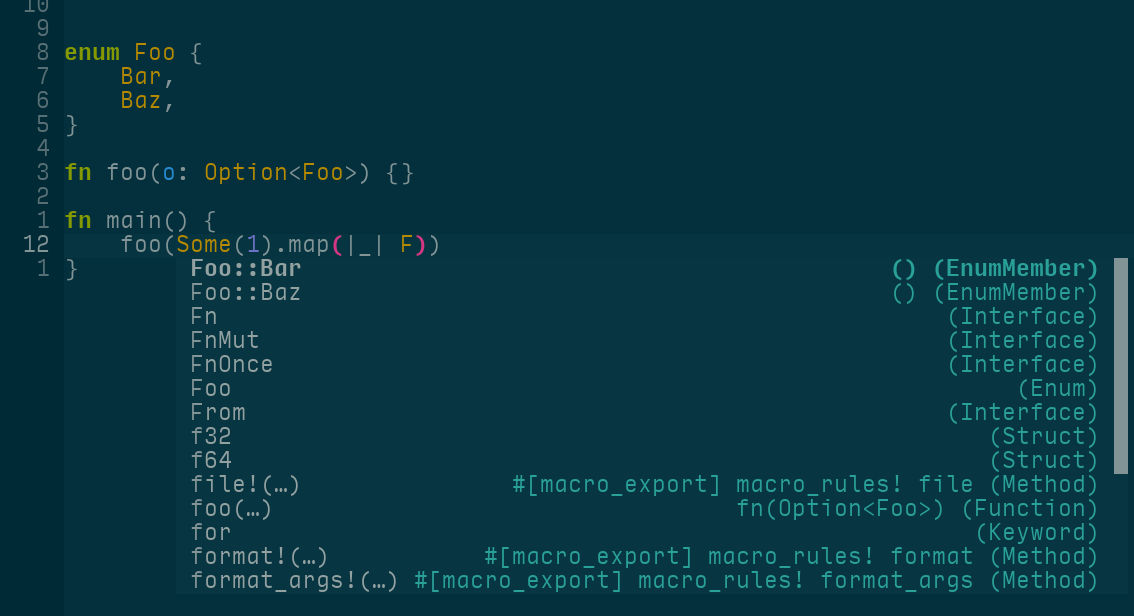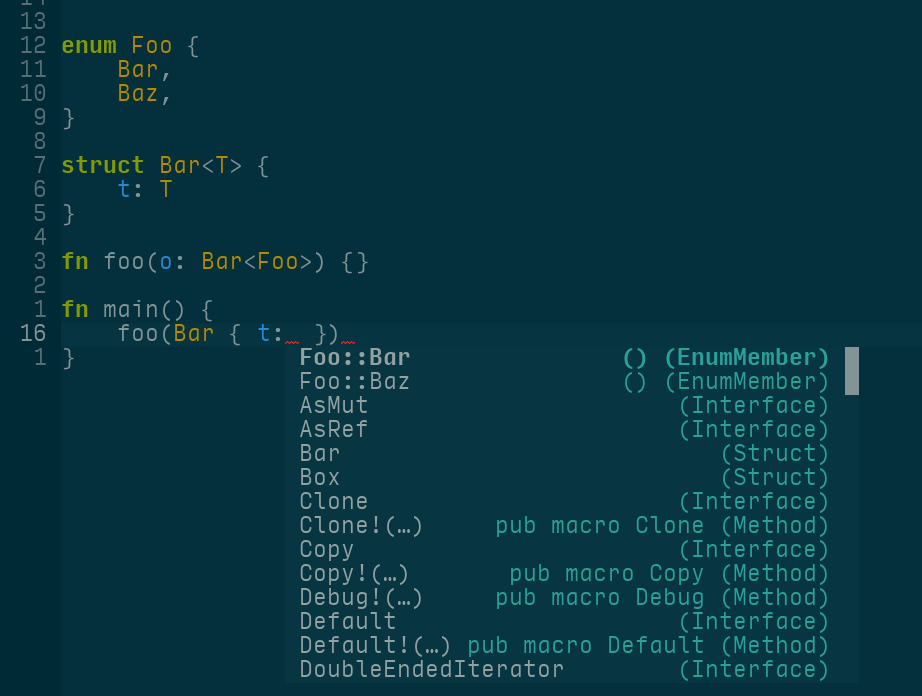| Commit message (Collapse) | Author | Age | Files | Lines |
|---|
| ... | |
| | | |
|
| | | |
|
| | | |
|
| | | |
|
| |/ |
|
| | |
|
| | |
|
| | |
|
| | |
|
| |\
| |
| |
| |
| |
| |
| |
| | |
8973: internal: move diagnostics to hir r=matklad a=matklad
Co-authored-by: Aleksey Kladov <[email protected]>
|
| | |
| |
| |
| |
| |
| |
| |
| |
| |
| |
| |
| |
| |
| |
| |
| |
| |
| |
| |
| |
| |
| |
| | |
The idea here is to eventually get rid of `dyn Diagnostic` and
`DiagnosticSink` infrastructure altogether, and just have a `enum
hir::Diagnostic` instead.
The problem with `dyn Diagnostic` is that it is defined in the lowest
level of the stack (hir_expand), but is used by the highest level (ide).
As a first step, we free hir_expand and hir_def from `dyn Diagnostic`
and kick the can up to `hir_ty`, as an intermediate state. The plan is
then to move DiagnosticSink similarly to the hir crate, and, as final
third step, remove its usage from the ide.
One currently unsolved problem is testing. You can notice that the test
which checks precise diagnostic ranges, unresolved_import_in_use_tree,
was moved to the ide layer. Logically, only IDE should have the infra to
render a specific range.
At the same time, the range is determined with the data produced in
hir_def and hir crates, so this layering is rather unfortunate. Working
on hir_def shouldn't require compiling `ide` for testing.
|
| | | |
|
| |/
|
|
| |
This should result in an implicit `-> ()`, not leaving out the binding.
|
| | |
|
| |
|
|
| |
This shaves off another ~4 mb or so
|
| |
|
|
|
| |
Doesn't save much memory (~2 mb), but interning things is generally a
good pattern to follow
|
| |\
| |
| |
| |
| |
| |
| |
| |
| |
| |
| |
| | |
8945: fix: Make expected type work in more situations r=flodiebold a=flodiebold
Also makes call info show the correct types for generic methods.


Co-authored-by: Florian Diebold <[email protected]>
|
| | | |
|
| |/ |
|
| | |
|
| | |
|
| | |
|
| | |
|
| | |
|
| | |
|
| | |
|
| | |
|
| | |
|
| | |
|
| | |
|
| | |
|
| | |
|
| | |
|
| | |
|
| | |
|
| |\ \
| | |
| | |
| | |
| | |
| | |
| | |
| | |
| | |
| | |
| | |
| | |
| | |
| | |
| | |
| | |
| | | |
8885: internal: greatly simplify eager macro representation r=jonas-schievink a=jonas-schievink
- Share structures with lazy macros, make both use `MacroCallLoc`.
- Remove `intern_eager_expansion`, `EagerCallLoc`, `EagerMacroId`, and *many* matches on `MacroCallId`.
- Make a lot of FIXMEs obsolete since the code no longer distinguishes between eager and lazy macros.
- Add `EagerCallInfo`, which is `Some` for calls to eager macros and holds the argument or expansion result and the included file.
8887: fix: fix derive collection after unresolved attribute fallback r=jonas-schievink a=jonas-schievink
Fixes https://github.com/rust-analyzer/rust-analyzer/pull/8882#issuecomment-844379170
bors r+
Co-authored-by: Jonas Schievink <[email protected]>
|
| | |/
|/| |
|
| |/ |
|
| |\
| |
| |
| |
| |
| |
| |
| |
| |
| |
| |
| | |
8882: internal: resolve attributes in name resolution (minimal version) r=jonas-schievink a=jonas-schievink
Closes https://github.com/rust-analyzer/rust-analyzer/pull/7049
This should not have any observable effect, since we don't attempt to expand attribute macros yet, and I have implemented a fallback that treats items with unresolved attributes as if the attribute wasn't there.
Derive helpers are not yet resolved. `#![register_{attr,tool}]` are not yet supported.
Co-authored-by: Jonas Schievink <[email protected]>
|
| | |
| |
| |
| | |
This allows reusing the original vector's allocation
|
| | | |
|
| | | |
|
| |\ \
| | |
| | |
| | |
| | |
| | |
| | |
| | | |
8871: internal: Simplify `DefCollector::resolve_macros` r=jonas-schievink a=jonas-schievink
bors r+
Co-authored-by: Jonas Schievink <[email protected]>
|
| | |/ |
|
| | | |
|
| | | |
|
| |\ \
| | |
| | |
| | |
| | |
| | |
| | |
| | |
| | |
| | |
| | |
| | |
| | |
| | |
| | |
| | | |
8813: Get some more array lengths! r=lf- a=lf-
This is built on #8799 and thus contains its changes. I'll rebase it onto master when that one gets merged. It adds support for r-a understanding the length of:
* `let a: [u8; 2] = ...`
* `let a = b"aaa"`
* `let a = [0u8; 4]`
I have added support for getting the values of byte strings, which was not previously there. I am least confident in the correctness of this part and it probably needs some more tests, as we currently have only one test that exercised that part (!).
Fixes #2922.
Co-authored-by: Jade <[email protected]>
|
| | | |
| | |
| | |
| | |
| | | |
* rename ConstExtension->ConstExt
* refactor a manual construction of a Const
|
| | | |
| | |
| | |
| | |
| | |
| | |
| | |
| | |
| | |
| | |
| | | |
Fix #2922: add unknown length as a condition for a type having unknown.
Incorporate reviews:
* Extract some of the const evaluation workings into functions
* Add fixmes on the hacks
* Add tests for impls on specific array lengths (these work!!! 😁)
* Add tests for const generics (indeed we don't support it yet)
|
| | | |
| | |
| | |
| | | |
Now we will get the type of `[0u8; 4]`.
|
